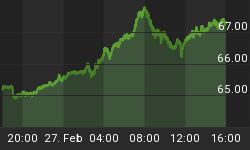With today's relatively benign jobs report coming in close to the consensus forecast and with the stock market comfortably above Monday's low, most on Wall Street are breathing a sigh of relief. The popular position is that last week's turmoil was simply a speed bump on the road to greater prosperity, and that a recession and a bear market are low probability events. As you may imagine, I beg to differ.
Despite the rebound, the technical and psychological damage to the stock market is major, and the odds that the carnage is over are slim. A more likely scenario is that the bear market rally that began for U.S. stocks in October of 2002 has ended, and a new leg down in this long-term bear market has begun. As for the likelihood of recession, not only does it seem to be highly probable, but it is more of an outright certainty. With the construction industry shedding 62,000 jobs last month (the most in sixteen years), it is clear that housing is already in recession! The major question is when the overall recession will begin: the second half of "07 or early '08?
The current train wreck unfolding in the sub-prime lending sector provides a good preview as to what will happen to the entire credit-financed bubble economy when the funding dries up. Contrary to the self-serving rhetoric of Wall Street and housing industry shills, the entire mortgage sector is not insulated from sub- prime. In fact, sub-prime is just the tip of the credit iceberg. Beneath the surface lie similar problems in Alt-A and prime loans, where borrowers also relied on adjustable rate mortgages to purchase over-priced homes that they could not otherwise afford.
With the sub-prime market drying up, most first-time home buyers will be unable to buy. Without those "starter-home" buyers, the trade-up buyers (most of whom have the ability to make down-payments and are therefore considered "prime borrowers") will be unable to sell their existing homes, and hence unable to trade up. This brings down the entire house of cards. Home prices must collapse, affecting all homeowners, regardless of their credit ratings.
How can anyone ignore last week's announcement by Freddie Mac that they would no longer buy loans where there is a "high likelihood" that borrowers cannot meet their monthly payments and which are "highly vulnerable to foreclosure." Talk about closing the barn door after the horse! This is tantamount to an admission that Freddie Mac formerly bought loans knowing full well that they would likely end in default!
When asked on CNBC why the agency had waited so long to impose tougher standards, the head of Freddie Mac explained that when home prices were rising, Freddie Mac did not think it wise to prevent sub-prime borrowers from profiting from the boom. In other words, since people were making piles of money by making bad bets on real estate prices, Freddie Mac did not want to turn down the action. So even though they knew speculative buyers were lying about their incomes and assets in order to purchase houses they could not afford, Freddie Mac did not want to rain on everyone's parade. So instead of acting responsibly, they simply kept the party going, held their noses, and bought the loans anyway. Unbelievable!!!
Since 70% plus of the U.S. economy is based on consumer spending, how can we possibly avoid a recession if the credit well financing much of it runs dry? Since home equity has been the principal asset collateralizing that credit, how can consumers keep borrowing and spending when housing prices fall? I heard one commentator on CNBC claim that the U.S. economy was in great shape except for housing. To me that's like a doctor telling a patient that he is in great health, except for the javelin sticking out of his chest. If housing is going down, there is no way on earth the entire economy does not get caught in its undertow.
For a more in depth analysis of the U.S. economy and why it I will likely collapse, read my new book "Crash Proof: How to Profit form the Coming Economic Collapse." Click here to order a copy today.
Also, make sure to protect your wealth and preserve your purchasing power before it's too late. Discover the best way to buy gold at www.goldyoucanfold.com, download my free research report on the powerful case for investing in foreign equities available at www.researchreportone.com, and subscribe to my free, on-line investment newsletter at http://www.europac.net/newsletter/newsletter.asp.















